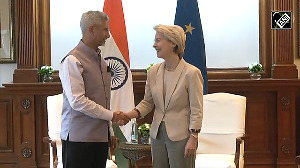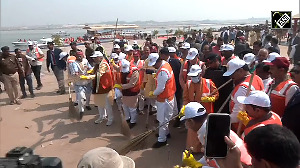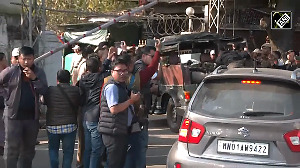UEFA have approved plans for artificial pitches to be used at national and club level from the 2005/06 season, European soccer's governing body said on Wednesday.
"For next season it will be possible to play on artificial turf in the Champions League or UEFA Cup or qualifiers for the World Cup and European championships," UEFA chief executive Lars-Christer Olsson said after an Executive Committee meeting.
"Now the quality has reached a level where it (artificial turf) is comparable to or even better than some of the natural turfs," he told reporters.
"The need (for artificial pitches) has been big for decades, if you come from countries where you have bad winters for example."
UEFA Cup matches have already been played on artificial turf at Moscow's Luzhniki stadium but they can only be used with the away side's consent.
Iceland's Hafnarfjordur refused to play a UEFA Cup match at Dunfermline's East End Park this season because the Scottish side have an artificial surface.
PLAYER QUOTAS
UEFA are also still discussing plans to introduce quotas on home-grown players in club football to combat the dilution of national identity at major clubs and a lack of real competition at the top of domestic leagues.
Olsson said talks were revolving around the idea of clubs having eight home-grown players and how to decide on criteria for identifying 'local' players.
"What that means exactly is still an open issue... whether it should be eight players educated in the club, or it could be some players educated in the club itself and some players educated within the region or within the association. That's still to be decided," said Olsson.
Under plans unveiled by UEFA in July, squads would be limited to 25 players of which up to four would have to be products of the club's development system and a further four trained in the same country.
The youth players would not have to be the same nationality as the club because under EU law there is free movement of players across the continent. Quotas would remain on players from non-EU countries.
Asked if clubs would try to get around any ruling by buying even younger talent from overseas, Olsson said this was a problem for UEFA.
"What is happening in practice is that the clubs are offering a job to the father and they move the family, not to give the father a job but to get the player," he said.
"This is something that we have to discuss with (world governing body) FIFA and we have to find a way of stopping it because otherwise it is very close to having child labour."
UEFA said it aimed to unveil a firm proposal on quotas at its congress in Tallinn, Estonia in April next year.








 © 2025
© 2025